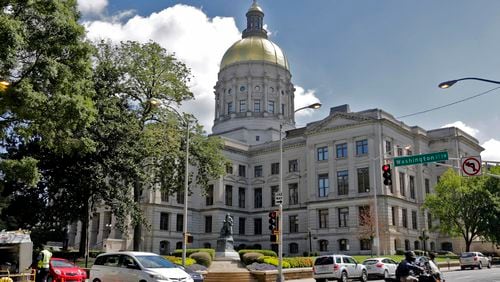It’s not an election year, but it might feel like one at the legislative session that starts Monday. And that could add an extra dose of intrigue during the 40-day session.
Yes, President-elect Donald Trump hasn’t even taken office, and more than a dozen recently elected lawmakers are ready to be sworn in. But it seems like the politicking has barely let up since November’s vote.
The jockeying for the 2018 governor’s race and a slate of statewide offices is well underway. A prominent Democrat is using his state Senate seat as a launching pad for November’s race for Atlanta mayor. And several sitting lawmakers are mulling a bid for an open U.S. House seat.
With contentious debates over illegal immigration crackdowns, a gun rights expansion and casino gambling in the mix, as well as more sweeping health and education policies, the angling for higher office is sure to factor into many votes, speeches and proposals.
“Legislating is always about herding cats,” University of Georgia political scientist Charles Bullock said, “but the cats might prove harder than ever to corral this year.”
And although lawmakers can’t raise money between Monday and the banging of the gavel on the last day of the session — Sine Die is typically in late March or early April — the next few months will set the stage for many political careers.
"The starting gun fires on Sine Die," said state Sen. Josh McKoon, himself a possible candidate for higher office. "So the politicking must start now."
And start it will.
First up is a race to replace U.S. Rep. Tom Price, who is set to resign to become Trump’s health secretary. No date has been set, but that election is likely to be held later this spring or summer.
At least a half-dozen legislators seriously considered a run for the conservative-leaning district, and state Sen. Judson Hill is already in. Hill and any other sitting lawmaker will have to resign to formally qualify for the seat. But until then everything he does will be seen in the context of a congressional bid.
And Hill plans to back conservative-friendly legislation that would prepare Georgia for the end of President Barack Obama’s health care law, boost Georgia’s military installations and otherwise “limit the growth of government.”
House Speaker Pro Tem Jan Jones, the second-ranking Republican in the chamber, already pulled her name out of contention. But several other lawmakers, including Price's wife, Betty, could join a field also likely to include former Secretary of State Karen Handel and ex-state Sen. Dan Moody.
Then there’s the wide-open race for Atlanta mayor in November. That contest features several current and former City Council members and city officials — and the No. 2 Democrat in the state Senate.
State Sen. Vincent Fort is running as a Bernie Sanders liberal in the race, and he has already vowed to decriminalize marijuana and make tuition free at Atlanta colleges if he's elected. He's likely to back another raft of left-leaning legislation this year, such as another push to increase the minimum wage.
“You’re not going to see a difference in the kind of legislation I introduce,” Fort said. “But what I find interesting is people running for office introducing bills they may not otherwise introduce — when circumstances make them a convert. People see it’s inauthentic.”
The race for statewide offices are beginning to form as well. Lt. Gov. Casey Cagle is all but guaranteed to seek to replace Gov. Nathan Deal, who cannot run for a third term in 2018. So could several state senators in his chamber, making for plenty of awkward scenarios over the next few months.
On the Democratic side of the aisle, House Minority Leader Stacey Abrams is also likely to seek higher office, and the stands she takes — and compromises she strikes — could loom over her bid.
And a sweep of other statewide offices could be vacant as well, depending on how the top of the ticket shakes out. The only constitutional officer who has said he’s definitely running for another term is Attorney General Chris Carr — and he was just appointed to that position by Deal a few weeks ago.
As for Deal, the next few months might be his last chance to get the bulk of his education policy initiatives adopted. By this time next year, the field running to succeed him will likely be settled, and much of the attention will be attuned to them. Already, Deal is eager to push back against suggestions that his clout is waning and his divide with the GOP rank and file is deepening.
“There are a number of politicians looking around the next curve to position themselves, trying to get their name in the news by introducing legislation and taking a stand,” Bullock said. “And it may make them less compliant toward initiatives by the governor and party leaders to move in lockstep.”
Then again, some longtime Capitol observers expect this session to be no different than many others.
“It’s really hard to tell what it means,” said John Watson, who was a top aide to Gov. Sonny Perdue and is now a candidate for Georgia GOP chairman. “But the reality is you can never take the politics out of the legislative session.”








